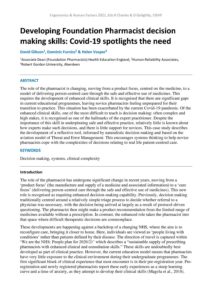| Document | Author David Gibson, Dominic Furniss & Helen Vosper |
| Abstract The role of the pharmacist is changing, moving from a product focus, centred on the medicine, to a model of delivering person-centred care through the safe and effective use of medicines. This requires the development of enhanced clinical skills. It is recognised that there are significant gaps in current educational programmes, leaving novice pharmacists feeling unprepared for their transition to practice. This situation has been exacerbated by the current Covid-19 pandemic. Of the enhanced clinical skills, one of the most difficult to teach is decision making: often complex and high stakes, it is recognised as one of the hallmarks of the expert practitioner. Despite the importance of this skill in underpinning safe and effective practice, relatively little is known about how experts make such decisions, and there is little support for novices. This case study describes the development of a reflective tool, informed by naturalistic decision making and based on the aviation model of Threat and Error Management. This encourages systems thinking to help novice pharmacists cope with the complexities of decisions relating to real life patient-centred care. |

